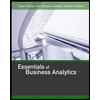
Loose Leaf for Corporate Finance Format: Loose-leaf
12th Edition
ISBN: 9781260139716
Author: Ross
Publisher: Mcgraw Hill Publishers
expand_more
expand_more
format_list_bulleted
Question
Chapter 4, Problem 2MC
Summary Introduction
Case summary:
B has completed his undergraduate degree in finance before six years. His aim is to become an investment banker, though he is satisfied with the present job. Person B was searching for the best college to do a MBA program, with which he thinks that he could achieve his aim. He was looking for University W and College M. The details of Person B's current job and his course details are provided.
Characters in the case:
- Person B
- University W
- College M
- Company DL
- College R
- College M
- School B
Adequate information:
- Person B is not allowed to work anywhere until the completion of MBA program.
- The salaries are not paid for the internship course.
To determine: The non-quantifiable factors that affect the decision of Person B.
Expert Solution & Answer
Want to see the full answer?
Check out a sample textbook solution
Students have asked these similar questions
Solve step by step no ai
Dont use ai solve it
Solve step by step correctly .
Chapter 4 Solutions
Loose Leaf for Corporate Finance Format: Loose-leaf
Ch. 4 - Prob. 1CQCh. 4 - Prob. 2CQCh. 4 - Prob. 3CQCh. 4 - Prob. 4CQCh. 4 - Time Value On subsidized Stafford loans, a common...Ch. 4 - Prob. 6CQCh. 4 - Prob. 7CQCh. 4 - Prob. 8CQCh. 4 - Prob. 9CQCh. 4 - Prob. 10CQ
Ch. 4 - Simple Interest versus Compound Interest First...Ch. 4 - Prob. 2QAPCh. 4 - Prob. 3QAPCh. 4 - Calculating Interest Rates Solve for the unknown...Ch. 4 - Prob. 5QAPCh. 4 - Prob. 6QAPCh. 4 - Prob. 7QAPCh. 4 - Calculating Rates of Return Although appealing to...Ch. 4 - Prob. 9QAPCh. 4 - Prob. 10QAPCh. 4 - Present Value and Multiple Cash Flows Specter Co....Ch. 4 - Prob. 12QAPCh. 4 - Calculating Annuity Present Value An investment...Ch. 4 - Prob. 14QAPCh. 4 - Prob. 15QAPCh. 4 - Prob. 16QAPCh. 4 - Calculating EAR First National Bank charges 11.4...Ch. 4 - Prob. 18QAPCh. 4 - Calculating Number of Periods One of your...Ch. 4 - Prob. 20QAPCh. 4 - Prob. 21QAPCh. 4 - Simple Interest versus Compound Interest First...Ch. 4 - Calculating Annuities You are planning to save for...Ch. 4 - Prob. 24QAPCh. 4 - Prob. 25QAPCh. 4 - Prob. 26QAPCh. 4 - Prob. 27QAPCh. 4 - Prob. 28QAPCh. 4 - Prob. 29QAPCh. 4 - Prob. 30QAPCh. 4 - Calculating Interest Expense You receive a credit...Ch. 4 - Prob. 32QAPCh. 4 - Growing Annuity Southern California Publishing...Ch. 4 - Prob. 34QAPCh. 4 - Prob. 35QAPCh. 4 - Prob. 36QAPCh. 4 - Prob. 37QAPCh. 4 - Calculating Loan Payments You need a 30-year...Ch. 4 - Prob. 39QAPCh. 4 - Prob. 40QAPCh. 4 - Prob. 41QAPCh. 4 - Prob. 42QAPCh. 4 - Prob. 43QAPCh. 4 - Prob. 44QAPCh. 4 - Prob. 45QAPCh. 4 - Prob. 46QAPCh. 4 - Prob. 47QAPCh. 4 - Prob. 48QAPCh. 4 - Prob. 49QAPCh. 4 - Prob. 50QAPCh. 4 - Prob. 51QAPCh. 4 - Prob. 52QAPCh. 4 - Prob. 53QAPCh. 4 - Prob. 54QAPCh. 4 - Prob. 55QAPCh. 4 - Prob. 56QAPCh. 4 - Prob. 57QAPCh. 4 - Prob. 58QAPCh. 4 - Prob. 59QAPCh. 4 - Prob. 60QAPCh. 4 - Prob. 61QAPCh. 4 - Prob. 62QAPCh. 4 - Prob. 63QAPCh. 4 - Prob. 64QAPCh. 4 - Prob. 65QAPCh. 4 - Prob. 66QAPCh. 4 - Prob. 67QAPCh. 4 - Prob. 68QAPCh. 4 - Prob. 69QAPCh. 4 - Prob. 70QAPCh. 4 - Prob. 71QAPCh. 4 - Prob. 72QAPCh. 4 - Prob. 73QAPCh. 4 - Prob. 74QAPCh. 4 - Rule or 69.3 A corollary to the Rule of 72 is the...Ch. 4 - Prob. 1MCCh. 4 - Prob. 2MCCh. 4 - Prob. 3MCCh. 4 - Prob. 4MCCh. 4 - Prob. 5MC
Knowledge Booster
Similar questions
arrow_back_ios
SEE MORE QUESTIONS
arrow_forward_ios
Recommended textbooks for you
 Essentials of Business Analytics (MindTap Course ...StatisticsISBN:9781305627734Author:Jeffrey D. Camm, James J. Cochran, Michael J. Fry, Jeffrey W. Ohlmann, David R. AndersonPublisher:Cengage Learning
Essentials of Business Analytics (MindTap Course ...StatisticsISBN:9781305627734Author:Jeffrey D. Camm, James J. Cochran, Michael J. Fry, Jeffrey W. Ohlmann, David R. AndersonPublisher:Cengage Learning Intermediate Financial Management (MindTap Course...FinanceISBN:9781337395083Author:Eugene F. Brigham, Phillip R. DavesPublisher:Cengage Learning
Intermediate Financial Management (MindTap Course...FinanceISBN:9781337395083Author:Eugene F. Brigham, Phillip R. DavesPublisher:Cengage Learning Cornerstones of Cost Management (Cornerstones Ser...AccountingISBN:9781305970663Author:Don R. Hansen, Maryanne M. MowenPublisher:Cengage Learning
Cornerstones of Cost Management (Cornerstones Ser...AccountingISBN:9781305970663Author:Don R. Hansen, Maryanne M. MowenPublisher:Cengage Learning Pfin (with Mindtap, 1 Term Printed Access Card) (...FinanceISBN:9780357033609Author:Randall Billingsley, Lawrence J. Gitman, Michael D. JoehnkPublisher:Cengage Learning
Pfin (with Mindtap, 1 Term Printed Access Card) (...FinanceISBN:9780357033609Author:Randall Billingsley, Lawrence J. Gitman, Michael D. JoehnkPublisher:Cengage Learning


Essentials of Business Analytics (MindTap Course ...
Statistics
ISBN:9781305627734
Author:Jeffrey D. Camm, James J. Cochran, Michael J. Fry, Jeffrey W. Ohlmann, David R. Anderson
Publisher:Cengage Learning


Intermediate Financial Management (MindTap Course...
Finance
ISBN:9781337395083
Author:Eugene F. Brigham, Phillip R. Daves
Publisher:Cengage Learning

Cornerstones of Cost Management (Cornerstones Ser...
Accounting
ISBN:9781305970663
Author:Don R. Hansen, Maryanne M. Mowen
Publisher:Cengage Learning

Pfin (with Mindtap, 1 Term Printed Access Card) (...
Finance
ISBN:9780357033609
Author:Randall Billingsley, Lawrence J. Gitman, Michael D. Joehnk
Publisher:Cengage Learning